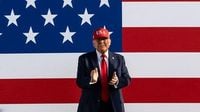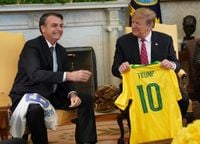On July 9, 2025, President Donald Trump announced a sweeping 50 percent tariff on all goods imported from Brazil, marking one of the steepest trade penalties ever imposed by the United States on a single country. The tariffs, set to take effect August 1, have sent shockwaves through international trade circles and ignited a fresh diplomatic dispute between the two nations.
Trump’s move is unusual not just for its severity but for the reasons behind it. While tariffs often stem from economic disputes, this one is partly a reaction to the political prosecution of former Brazilian President Jair Bolsonaro, a figure Trump has openly supported. Bolsonaro and dozens of his allies were charged in February 2025 with plotting to remain in power after losing the 2022 presidential election to current leader Luiz Inácio Lula da Silva. The alleged coup attempt reportedly involved plans to poison Lula and assassinate a Brazilian Supreme Court justice.
In a sharply worded letter to President Lula, Trump condemned Brazil’s handling of Bolsonaro’s trial as an "international disgrace" and a "Witch Hunt that should end immediately." He framed the tariff as a response to what he described as Brazil’s "insidious attacks on Free Elections and the fundamental Free Speech Rights of Americans." The letter also accused Brazil of maintaining an "unfair trade relationship" with the U.S., citing "Tariff, and Non-Tariff, Policies and Trade Barriers."
"The way that Brazil has treated former President Bolsonaro, a Highly Respected Leader throughout the World during his Term, including by the United States, is an international disgrace," Trump wrote. "This Trial should not be taking place. It is a Witch Hunt that should end IMMEDIATELY!"
Trump’s tariffs are part of a broader strategy. Earlier in July, he threatened steep tariffs against more than a dozen other countries, with most set to begin August 1 as well. However, Brazil is the only nation to face the maximum 50 percent tariff rate this week, underscoring the personal and political nature of this particular dispute. Notably, the U.S. runs a trade surplus with Brazil, exporting about $49 billion worth of goods to Brazil in 2024, while importing just over $42 billion, according to Census Bureau figures.
Adding to the tensions, Trump ordered U.S. Trade Representative Jamieson Greer to investigate Brazil for "attacks on the Digital Trade Activities of American Companies" and "other unfair Trading Practices." This appears to reference Brazil’s regulatory actions affecting platforms like Elon Musk-owned X, which Trump cited as part of "insidious attacks" on Americans’ free speech rights.
Brazilian President Lula responded swiftly, asserting Brazil’s sovereignty and vowing to retaliate. "Brazil is a sovereign country with independent institutions that will not accept being abused by anyone," Lula said in a statement. He emphasized that the case against Bolsonaro is "the sole responsibility of the Brazilian Judiciary," signaling that Brazil will not bow to external pressure on its legal processes. Lula also indicated that Brazil would invoke its economic reciprocity law, allowing it to impose countermeasures against the U.S. tariffs.
The escalating dispute points to a potential trade war between the U.S. and Brazil, with significant economic and political consequences. The United States is Brazil’s second-largest trading partner after China, so disruptions could ripple through both economies. Trump’s letter explicitly linked the tariffs to a desire to "have the Level Playing Field we must have with your Country" and to "rectify the grave injustices of the current regime," clearly tying trade policy to political grievances.
Bolsonaro, who has been banned from running for office until 2030 partly due to casting doubt on Brazil’s electronic voting machines, has vehemently denied the charges against him. His trial, ongoing since earlier this year, has drawn international attention, especially given the parallels some observers draw between Bolsonaro’s efforts to remain in power and Trump’s own refusal to concede the 2020 U.S. presidential election.
Trump’s use of tariffs as a tool to influence foreign judicial proceedings is unprecedented. It underscores the increasingly personalized and politicized nature of U.S. trade policy under his administration. While tariffs are often justified as measures to protect domestic industries or correct unfair trade practices, here they serve as a form of political leverage.
The broader context includes Trump’s earlier sweeping tariff announcements in April 2025, dubbed “Liberation Day” tariffs, which threatened higher duties on dozens of countries. Many of those tariffs were delayed for three months as his administration sought trade negotiations, but with the extension expiring in July, the administration began sending out notices of impending increases.
Brazil’s average tariff rate on imports stood at 11.2 percent as of 2023, according to a U.S. Trade Representative report. The report noted that Brazil frequently modifies tariff rates and imposes various trade restrictions, including tariffs on ethanol and import licensing rules, which create uncertainty for U.S. exporters. Trump’s administration has indicated it would consider adjusting tariffs if Brazil reforms these practices.
The dispute also ties into wider geopolitical tensions. Trump separately threatened an additional 10 percent tariff on countries aligned with what he calls the "Anti-American policies of BRICS," a bloc that includes Brazil, Russia, India, China, and South Africa. This signals a broader U.S. strategy to confront emerging market powers perceived as adversaries.
Economic analysts warn that the tariffs could lead to higher consumer prices in both countries and slow economic growth. Trade wars historically have a tendency to escalate beyond initial intentions, potentially damaging industries and workers on both sides. Yet, Trump remains resolute, arguing that tariffs are essential to revive U.S. manufacturing and punish unfair trade practices.
As the August 1 deadline approaches, all eyes are on how Brazil will respond and whether diplomatic efforts can de-escalate the situation. For now, the trade relationship between two of the Americas’ largest economies hangs in the balance, caught between political disputes and economic interests.






